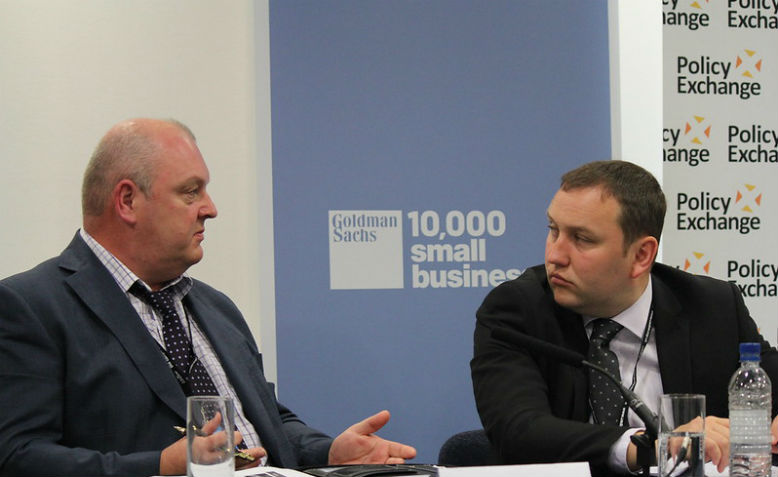 Ian Murray MP (right), 2014. Photo: Flickr/Policy Exchange
Ian Murray MP (right), 2014. Photo: Flickr/Policy Exchange
Labour’s record on independence means we shouldn’t expect a rush of Corbynista MPs from Scotland, argues Chris Bambery
There is no longer a UK General Election. The election picture varies greatly in each component part of the United Kingdom. In England the battle is between Boris Johnson’s Conservatives and Jeremy Corbyn’s Labour. In Northern Ireland it’s between the Democratic Unionist Party and Sinn Fein. In Wales Labour, the Tories, Plaid Cymru and the Liberal Democrats are engaged in a more complex battle. In Scotland it’s between the Scottish National Party and the Conservatives, the former championing independence, the latter the Union.
At this point readers may be asking about Scottish Labour, until recently the dominant party in Scotland. My friend and comrade Vladimir Unkovski-Korica paints an interesting picture of going canvassing for Scottish Labour in Glasgow North. There the campaign was clearly pro-Corbyn. Vladimir is right that Corbyn’s message chimes with many in Scotland except on his stand on independence, and I might add Labour’s refusal to join the SNP in committing to scrap Trident replacement.
But let us travel 40 miles east to Edinburgh East. The Scottish Labour candidate there, Sheila Gilmore, who was defeated by the SNP’s Tommy Sheppard in 2015, has put out a leaflet which makes no mention of Jeremy Corbyn, Scottish Labour leader Richard Leonard or any of Labour’s radical pledges. Instead the stress is “Remain the in European Union” and “Remain in the United Kingdom.” Instead of an endorsement from Corbyn it has one from former Prime Minister Gordon Brown, which starts:
“Sheila Gilmore shares my values. Like me she believes that we should remain in both the EU and the UK.”
Gilmore is not alone. The neighbouring constituency is East Lothian, taken from the SNP’s George Kerevan by Scottish Labour’s Martin Whitfield in 2017. Like Gilmore his leaflet fails to mention Corbyn, Leonard or Labour’s radical pledges. His endorsement comes from Iain Gray MSP, the former Scottish Labour leader from 2008-2011. Gray was loyal to Tony Blair and Gordon Brown and had a less than distinguished record.
Scottish Labour holds one seat in Edinburgh. The MP for Edinburgh South is Ian Murray. He looks set to hold the seat but on the basis of a campaign which – you guessed it – doesn’t mention Corbyn and stresses not just his opposition to independence but points up his pan-Unionist credentials. Murray is a constant critic of Corbyn and his re-election will not benefit the Labour leader in anyway. The SNP candidate is Catriona MacDonald, a young woman came who into politics during the 2014 independence referendum, founding a chapter of Common Weal in Edinburgh to promote local democracy and campaign for social and economic equality.
In Edinburgh Scottish Labour is concentrating on campaigning in just Edinburgh South. But campaigning for Ian Murray is clearly not to the taste of many members.
Scottish Labour came third in 2017, trailing the SNP, who came first, and the Conservatives. In the opinion polls in this election they have remained in third place and there is, as yet, little sense of a Corbyn bounce (that was evident in 2017 despite Scottish Labour’s campaign tippexing out any mention of Corbyn).
In Edinburgh East the sitting SNP MP is Tommy Sheppard, former Assistant General Secretary of Scottish Labour who was bumped because he was too left wing. If you had to choose between his radical credentials and those of Sheila Gilmore it would be an easy choice.
In East Lothian the SNP candidate is Kenny MacAskill who is a socialist and has written about Red Clydeside and Scotland’s radical tradition. You might remember him as the Scottish Cabinet Secretary for Justice who in 2009 released the supposed Lockerbie bomber of a Pan Am airliner, Abdelbaset al-Megrahi, on compassionate grounds because of terminal illness.
Again, if you had to decide, on the basis of radical credentials, between MacAskill and Whitfield the former would romp home.
The point I am trying to make is that given the current state of the polls people outside Scotland should not be building up hopes that a substantial cohort of Corbynista MPs will be heading to Westminster to help push through radical policies.
Why is this? After all Scotland was until recently a Labour fiefdom they took very much for granted. Under New Labour the SNP took up Old Labour rhetoric and began capturing Labour support. But the decisive mistake was to join with the Conservatives during the 2014 referendum to oppose independence. By placing themselves firmly in the anti-independence camp, targeting the SNP rather than the Tories, they created a situation where those who wanted to vote for the Union began voting for the hardest pro-Union party, the Tories.
Things might have changed under a new left wing leader of Scottish Labour, Richard Leonard. But aside from being uninspiring he has continued to concentrate fire on the SNP and on holding a second independence referendum.
So as I write from Edinburgh the election in Scotland is very different from that down south and I expect the results to be too.

